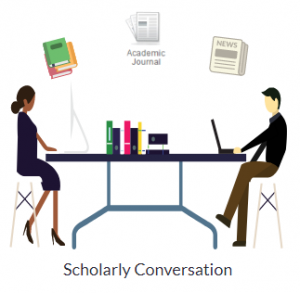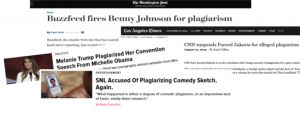Chapter 8: Avoiding Plagiarism
In this chapter you will learn about the importance of academic integrity and the use of citations to help you avoid plagiarism.
Learning Objectives:
- Define plagiarism and describe the consequences of academic dishonesty.
- Identify strategies for preventing plagiarism.
- Recognize the purpose for citing sources in academic writing.
- Employ basic citation rules to ensure proper attribution in academic writing.
ACRL Frame Alignment:
Scholarly Conversation
As a student you’re participating in a scholarly conversation anytime you write a paper, complete a research project, or make a speech describing, arguing, or synthesizing information on a topic you’ve studied. In this conversation you are listening to lots of different voices such as your professors, the authors of your textbooks, journalists reporting on an issue, and researchers who have performed studies or analyzed that issue.
you’ve studied. In this conversation you are listening to lots of different voices such as your professors, the authors of your textbooks, journalists reporting on an issue, and researchers who have performed studies or analyzed that issue.
Through your academic assignments, you’re adding your voice to the discussion. Depending on the purpose of the assignment you may be:
- synthesizing and drawing connections between what others have said on an issue
- explaining your personal experiences related to the topic, and/or
- expressing your own opinions or conclusions about what the research shows.
For this scholarly conversation to be successful, though, you have to approach your academic assignments with honesty, use information sources effectively, and give proper credit to the other voices in the conversation through attribution and citation.
Academic Honesty
In your college courses, it’s expected that you (and only you) will do the assigned work. By completing the assignments, papers, quizzes, and exams, you are showing that you have mastered the content of the course – meaning you have learned the information and gained the skills covered in that class. (Your grade shows how well you’ve done that.)
When you are dishonest in your academic work, either by cheating or plagiarizing another person’s work, the learning process breaks down.
Cheating
Cheating is dishonestly trying to get credit for academic work and can include:
- Submitting work that is not your own (example: downloading a paper from the Internet)
- Submitting work you previously completed for another course
- Cheating during a quiz or exam, or
- Allowing another student to copy or plagiarize your work.
Cheating is intentional and a serious act, which can have major consequences. We’ll get into those consequences a little later. For now, just know that cheating harms your chances for academic success.
Plagiarism
Plagiarism is using someone else’s words or ideas in your academic work without giving credit to the original author. In college, the way we most often give credit is in the form of a citation. Plagiarism can include:
- Summarizing the ideas, statements of fact, or conclusions made by another without citing the source,
- Word-for-word copying of work written by someone else without quotation marks and/or a citation.
- Close or extended paraphrasing of another person’s work without acknowledging the source. In other words, you’ve taken someone else’s ideas and changed a few words here and there, but haven’t acknowledged where you got the idea from.
- Using an image, video, or music without permission and/or proper attribution.
Plagiarism can be intentional, meaning you knowingly copied the words of another person in your paper. Or it can be unintentional, meaning you weren’t trying to pass off someone else’s ideas as your own, but you didn’t properly cite your sources. Unintentional plagiarism often happens when students don’t know citation rules, fail to keep track of their research, or are rushing and/or disorganized when completing an assignment.
Plagiarism Detection
You should be aware that many instructors require the use of a plagiarism detection tool called TurnItIn. If your instructor is using this tool, your papers and assignments could be compared to a large database of material to search for signs of matching text. If you have not quoted, paraphrased, or cited sources properly, you could be accused of academic dishonesty. If you have questions about TurnitIn , ask your instructor for more details.
Consequences of Academic Dishonesty
There are big consequences for academic dishonesty. If you plagiarize or cheat at a Los Rios college, you could face one or more of these consequences:
- Receiving a failing grade on the assignment
- Receiving a lower overall grade in the class
- Failing the class altogether
- Being referred to the College’s Disciplinary Officer and/or
- Being placed on disciplinary probation, suspension or even expulsion from the College.
Even if you are not caught cheating or plagiarizing, you are still damaging your opportunity to learn from the coursework.
Plagiarism isn’t just an issue that matters while you are in college. Using the words, ideas, or creative works of another person without their permission or without giving them credit can have serious consequences in the “real world” too. Take a look at these headlines…

If you plagiarize in your career you could face job penalties like firing or suspension, your reputation could be damaged, and you could even face lawsuits.
Clearly, plagiarism and cheating are things you want to avoid.
Plagiarism can be avoided when you learn to give proper credit through attribution and citation and when you learn to use information sources effectively by staying organized throughout the research and writing process. Let’s explore and practice these skills.
Attribution
This chapter adapted from the Los Rios Libraries Information Literacy Tutorials and is licensed under a Creative Commons Attribution-NonCommercial 4.0 International License unless otherwise specified.
Crediting ideas, words, or works to a particular author, artist, or person.
A note describing the original source of ideas, words, or works included in a research paper or project.

